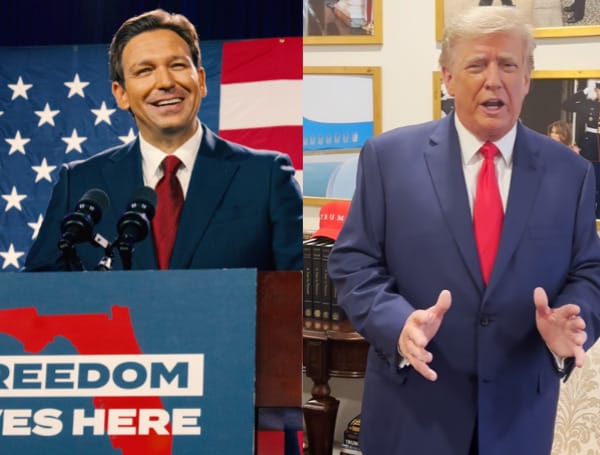Nevada has emerged as a pivotal early state on the 2024 election calendar, drawing attention from Republican presidential candidates who recognize its significance.
While Iowa and New Hampshire have traditionally taken the spotlight, Nevada’s role in shaping the nomination process cannot be underestimated.
In recent times, Nevada’s political landscape has garnered much less attention compared to Iowa and New Hampshire.
However, this narrative is set to change as most of the Republican presidential candidates converge in Las Vegas for the Republican Jewish Coalition’s annual meeting.
This gathering has gained added significance due to the Israel-Hamas war, making it a prominent platform for candidates to express their views and engage with potential voters.
The Front-Runner’s Strategy
Donald Trump, the front-runner for the Republican nomination, recognizes the importance of Nevada in his campaign strategy. As part of his efforts to woo potential Nevada caucusgoers, Trump will be addressing the Republican Jewish Coalition’s annual meeting.
Following this, he will host a campaign organizing event in the evening, aiming to secure commitments from voters who may participate in the Feb. 8 caucuses. Trump’s team is leaving no stone unturned in their bid to lock in support from Nevada Republicans.
Primary vs. Caucuses: A Unique Setup
Unlike many other states, Nevada’s election process consists of both a primary election and caucuses.
This setup has drawn criticism from within the Nevada GOP, with concerns raised about potential voter confusion and allegations that the state party is favoring Trump.
It is important to understand the distinction between the primary and caucuses in order to grasp the dynamics at play.
Primary Election: Ensuring Universal Participation
As required by state law, Nevada will hold a primary election on Feb. 6, which will be open to all registered Republicans.
In adherence to Nevada law, a state-run ballot will be mailed to every resident, ensuring universal participation. This move has been welcomed by those who believe in the importance of inclusivity and maximizing voter turnout.
Caucuses: Determining Delegates
While the primary election guarantees universal participation, the caucuses will ultimately decide which candidate receives Nevada’s delegates for the nomination.
The caucuses, which the state party runs, rely on the party apparatus and candidates’ campaigns to educate voters about the process. This presents a unique challenge in terms of ensuring voter understanding and engagement.
Embracing the Caucus System
Despite concerns and criticism, Nevada Republican Party Chairman Michael McDonald has been a strong advocate for caucuses.
McDonald believes that caucuses provide an opportunity for candidates to showcase their grassroots support and engage in boots-on-the-ground campaigning. He argues that the caucus system allows each candidate to perform and get to know voters across all counties in Nevada.
Differing Approaches: Primary or Caucuses?
While some Republican candidates have opted for the primary election, others have chosen to participate in the caucuses.
Former U.N. Ambassador Nikki Haley, former Vice President Mike Pence, and South Carolina Sen. Tim Scott have decided to compete in the primary.
On the other hand, Donald Trump, Florida Gov. Ron DeSantis, businessman Vivek Ramaswamy, former New Jersey Gov. Chris Christie, and North Dakota Gov. Doug Burgum are preparing for the caucuses.
Challenges in Caucus Organizing
Organizing the caucuses presents its own set of challenges, particularly for county Republican parties across Nevada.
The resignation of the Clark County GOP vice chair, who would have been responsible for organizing the Las Vegas-area caucus sites, has raised concerns and highlighted potential disagreements within the party.
Central Committee members in Las Vegas have expressed their frustration over the lack of communication and support from the Clark County GOP regarding the caucuses.
Rural Nevada: Unique Obstacles
While the challenges in organizing caucuses are evident in urban areas, rural Nevada faces its own unique obstacles. In Elko County, located in the rural mining region of the state, GOP Chairman Lee Hoffman is grappling with the task of setting up caucus sites that are more than 100 miles away from the county’s hub.
With a vast geographic area and a scattered population, educating Republican voters about the caucuses poses a significant challenge for Hoffman and his team.
Educating Republican Voters
Educating Republican voters about the caucus process is crucial to ensure their active participation. With mail-only ballots utilized in the general election in remote areas of the state, reaching out to voters in these regions becomes even more challenging.
Efforts are underway to educate voters on the process and organize caucus locations effectively.
Hoffman acknowledges the need for concerted efforts to educate Republican voters in Elko County, recognizing that it will require significant time and resources.
Android Users, Click To Download The Free Press App And Never Miss A Story. Follow Us On Facebook and Twitter. Signup for our free newsletter.
We can’t do this without your help; visit our GiveSendGo page and donate any dollar amount; every penny helps

